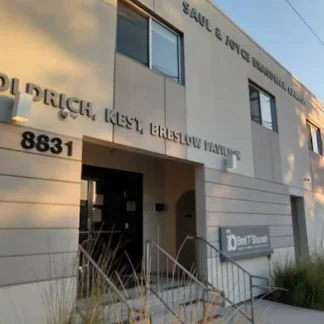Breathe Life Healing Centers
Breathe is dedicated to outstanding trauma-informed clinical care to each client...
Beit T’Shuvah, located in Los Angeles, California, offers addiction treatment services for individuals and their families as they move from living a life of addiction toward recovery. Their services are based on best, standard practices that produce outcomes.
Beit T’Shuvah offers intervention services, residential treatment, and family programming.
The intervention services are for those who are seeking outside support to help confront and support an individual who is misusing substances and who needs treatment. This service works closely with the family or loved ones involved in helping create change.
The residential treatment program at Beit T’ Shuvah, is for residents who are in the first 4 – 6 months of their treatment process. This program involves individual counseling, group counseling, spiritual counseling, therapy, and psychiatric care. It also provides an introduction to AA and the 12 Steps as important foundational principles for long-term recovery.
The family program at Beit T’ Shuvah offers family education, process groups, mentoring, and immersion.
Contact us for more information: (310) 204-5200

Connect with Beit T'Shuvah by calling their admissions team directly.
(310) 204-5200 Website Get DirectionsThe Joint Commission, formerly known as JCAHO, is a nonprofit organization that accredits rehab organizations and programs. Founded in 1951, the Joint Commision's mission is to improve the quality of patient care and demonstrating the quality of patient care.
Joint Commission Accreditation: Yes
Creativity is inherently healing, and can help those in recovery express thoughts or feelings they might not otherwise be able to. Creative arts therapy can include music, poetry/writing, painting, sculpting, dance, theater, sandplay, and more. Unlike traditional art, the final product matters far less than the experience of creation and expression itself.
The Family Program understands that addiction affects the entire family. Dedicated to providing emotional and spiritual healing, this program guides each family through the process of recovery at Beit T'Shuvah. The Family Program offers comprehensive family treatment including: family support groups, family education groups, multi-family process groups, out of town family immersion weekends, a parents focused Al-Anon group, individual family therapy, as well as consultation and intervention services for families and individuals in crisis.
Group therapy is any therapeutic work that happens in a group (not one-on-one). There are a number of different group therapy modalities, including support groups, experiential therapy, psycho-education, and more. Group therapy involves treatment as well as processing interaction between group members.
Trauma therapy addresses traumatic incidents from a client's past that are likely affecting their present-day experience. Trauma is often one of the primary triggers and potential causes of addiction, and can stem from child sexual abuse, domestic violence, having a parent with a mental illness, losing one or both parents at a young age, teenage or adult sexual assault, or any number of other factors. The purpose of trauma therapy is to allow a patient to process trauma and move through and past it, with the help of trained and compassionate mental health professionals.
The Family Program understands that addiction affects the entire family. Dedicated to providing emotional and spiritual healing, this program guides each family through the process of recovery at Beit T'Shuvah. The Family Program offers comprehensive family treatment including: family support groups, family education groups, multi-family process groups, out of town family immersion weekends, a parents focused Al-Anon group, individual family therapy, as well as consultation and intervention services for families and individuals in crisis.
Group therapy is any therapeutic work that happens in a group (not one-on-one). There are a number of different group therapy modalities, including support groups, experiential therapy, psycho-education, and more. Group therapy involves treatment as well as processing interaction between group members.
Trauma therapy addresses traumatic incidents from a client's past that are likely affecting their present-day experience. Trauma is often one of the primary triggers and potential causes of addiction, and can stem from child sexual abuse, domestic violence, having a parent with a mental illness, losing one or both parents at a young age, teenage or adult sexual assault, or any number of other factors. The purpose of trauma therapy is to allow a patient to process trauma and move through and past it, with the help of trained and compassionate mental health professionals.
Group therapy is any therapeutic work that happens in a group (not one-on-one). There are a number of different group therapy modalities, including support groups, experiential therapy, psycho-education, and more. Group therapy involves treatment as well as processing interaction between group members.
Trauma therapy addresses traumatic incidents from a client's past that are likely affecting their present-day experience. Trauma is often one of the primary triggers and potential causes of addiction, and can stem from child sexual abuse, domestic violence, having a parent with a mental illness, losing one or both parents at a young age, teenage or adult sexual assault, or any number of other factors. The purpose of trauma therapy is to allow a patient to process trauma and move through and past it, with the help of trained and compassionate mental health professionals.
Trauma therapy addresses traumatic incidents from a client's past that are likely affecting their present-day experience. Trauma is often one of the primary triggers and potential causes of addiction, and can stem from child sexual abuse, domestic violence, having a parent with a mental illness, losing one or both parents at a young age, teenage or adult sexual assault, or any number of other factors. The purpose of trauma therapy is to allow a patient to process trauma and move through and past it, with the help of trained and compassionate mental health professionals.
Breathe is dedicated to outstanding trauma-informed clinical care to each client...
Children’s Bureau - Magnolia Place Family Center, in Los Angeles, California, of...
Synergy Sober House is a private rehab located in Los Angeles, California. Syner...
Profound Treatment, located in Woodland Hills, California, offers medical detox ...